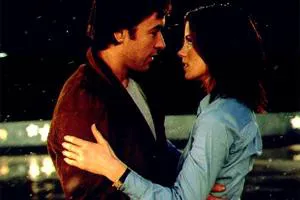Serendipity: A Twist of Fate or Just Another Rom-Com?

This film borrows a Dickensian concept from Europe: the idea that marriages are made in heaven, regardless of earthly circumstances. This notion provides a promising premise. One Christmas in New York City, two strangers bump into each other and find it hard to part ways. However, in response to his advances, she insists that their encounter requires proof of its significance. He writes his phone number on a dollar bill, which is immediately exchanged, while she writes hers on the cover of a Marquez novel, which is promptly sold to a bookseller. If these items ever find their way back to them, it’s fate. If not, then it wasn’t meant to be.
Lost Opportunities and Familiar Tropes
The adventures of the dollar bill and the book as capricious agents of fortune could have been a source of much amusement. Unfortunately, while they do reappear later, the rest of the film feels distinctly American. Years later, both He and She are about to marry other people, but the pre-wedding jitters trigger memories of that unique encounter, and they decide to test fate. The search for each other becomes endless and hopeless. He exits an elevator and turns right; a minute later, she exits the adjacent elevator on the same floor of the same hotel and turns left. He sees her with someone else and assumes she has forgotten him, but it was just a neighbor. These kinds of jokes feel outdated, reminiscent of silent comedies.
Everything feels cliché: the chases, the misunderstandings, the deceptions, and the classic Hollywood conclusion that people are the masters of their own destiny. The happy ending, instead of inspiring optimism, only brings relief that it’s finally over. The director seems to have felt the same relief, as the finale feels rushed, neglecting to show what happened to her fiancé or how his wedding was called off.

Even the appealing John Cusack (“Being John Malkovich”) and the promising Kate Beckinsale (“Pearl Harbor”) appear rather lackluster in the lead roles. Their initial encounter doesn’t lead to love, and they don’t seem particularly well-suited for each other, lacking that raw, fateful attraction. Furthermore, they don’t even meet again until the very end. Playing love without a partner, discussing it with colleagues, and sleeping soundly with their respective fiancés and fiancées each night is an unrewarding task. All that’s left is to pose against the backdrop of the Waldorf Astoria, Central Park, and expensive shops and restaurants.
A Tourist’s Delight?
As a result, the film feels like a scenic tour, appealing only to tourists who haven’t yet visited New York. On the other hand, there’s nothing entirely unpalatable that couldn’t be served at a New Year’s holiday table. It might even give some newlyweds a chance to sort out their past and live happily ever after.